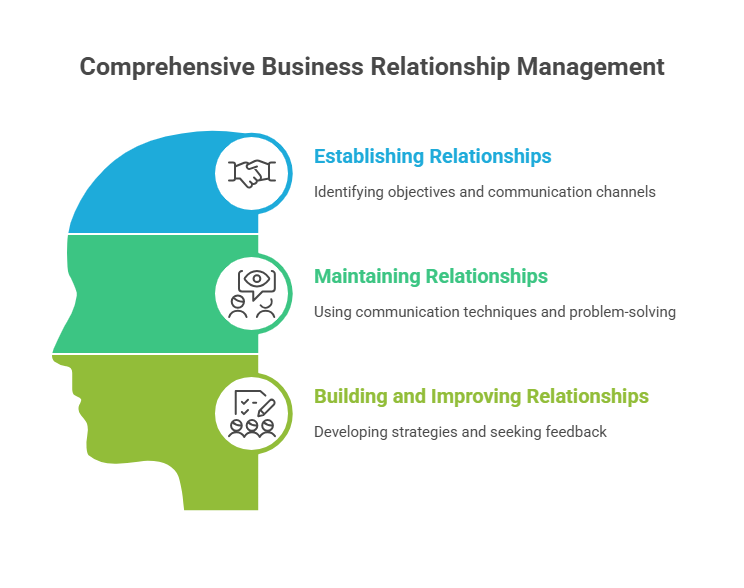Organisational Plans in Building and Maintaining Business Relationships
Posted by SkillMaker in Oct, 2025
What is a concise description of organisational plans in building and maintaining business relationships?

Organisational plans in building and maintaining business relationships refer to strategic frameworks that guide how businesses establish, nurture, and sustain connections with stakeholders. These plans ensure effective communication, trust-building, and value exchange, fostering long-term collaboration and mutual benefits.
Listen to this article as a podcast
Why do people in the Public sector industry need organisational plans in building and maintaining business relationships?
In the Public sector industry, strong business relationships are essential for promoting public interest and achieving strategic goals. Organisational plans enable Public sector entities to engage effectively with other governmental bodies, private partners, and the community, ensuring transparency, accountability, and cooperation. This can lead to enhanced service delivery, better resource allocation, and improved policy implementation.
“Organisational plans in business relationships cultivate trust and cooperation, forming the backbone of successful and sustained engagements.”
What are the key components or elements of organisational plans in building and maintaining business relationships?
Key components include:
- Stakeholder Identification: Recognising and categorising individuals or groups that impact or are impacted by the organisation.
- Communication Strategy: Creating clear and consistent communication channels.
- Value Proposition: Articulating benefits of the relationship to all parties involved.
- Trust-Building Initiatives: Establishing credibility through actions and transparency.
- Feedback and Improvement: Regularly soliciting and acting on input from partners.
What key terms, with descriptions, relate to organisational plans in building and maintaining business relationships?

Registered Trademark“®”
- Stakeholder Analysis: The process of assessing the influence and interests of stakeholders.
- Networking: Engaging with others to exchange information and develop professional or social contacts.
- Collaborative Partnership: A committed relationship where parties work together to achieve common goals.
- CRM (Customer Relationship Management): A strategy for managing interactions with current and future customers.
- Relationship Marketing: Focused efforts on building long-term customer loyalty.
Who is typically engaged with operating or implementing organisational plans in building and maintaining business relationships?
Roles involved include relationship managers, business development executives, customer service representatives, communication officers, and leaders within an organisation. These individuals collaborate to develop strategies and maintain rapport with stakeholders across various sectors.
How do organisational plans in building and maintaining business relationships align or integrate with other components of the Public sector industry in Australia?

Such plans integrate seamlessly with efforts to enhance government accountability, engage communities, and improve service delivery. By fostering robust relationships, the Public sector can effectively address citizen needs, collaborate regionally, and adapt to changing policy landscapes, ensuring a cohesive approach to governance and public service.
Where can the student go to find out more information about organisational plans in building and maintaining business relationships?
What job roles would be knowledgeable about organisational plans in building and maintaining business relationships?
Roles include:
- Relationship Managers
- Business Development Executives
- Customer Service Representatives
- Public Relations Officers
- Strategic Partnership Managers
What are organisational plans in building and maintaining business relationships like in relation to sports, family, or schools?

In sports, organisational plans resemble a team’s playbook, ensuring every player knows their role and the strategy to achieve victory. Within a family, they are akin to a family meeting agenda, where clear communication and shared responsibilities maintain harmony. In schools, these plans equate to classroom management strategies, guiding interactions and fostering a positive educational environment for effective learning.
(The first edition of this post was generated by AI to provide affordable education and insights to a learner-hungry world. The author will edit, endorse, and update it with additional rich learning content.)
(Skillmaker – 2025)

 Post Tagged with
Post Tagged with